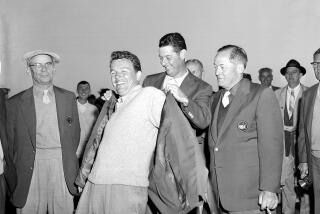Budge, First to Win Grand Slam, Dies
- Share via
Don Budge, the first player and only American man to win tennis’ Grand Slam, died Wednesday in Scranton, Pa., of cardiac arrest. He was 84.
Budge, who had been injured in a car accident Dec. 14, died at Mercy Hospital. After the accident, Budge improved enough to be moved to a nursing home near his residence in Dingmans Ferry. He entered Mercy Hospital on Jan. 17.
The cornerstone of Budge’s all-court game was the redheaded Californian’s devastating backhand, considered by many experts as tennis’ best. In addition to the 1938 Grand Slam, he played in what was said to be the one of the best Davis Cup matches, defeating German Baron Gottfried Von Cramm in 1937. The five-set thriller was delayed by a last-minute phone call to Von Cramm from Hitler.
The next year, Von Cramm was in a Nazi prison instead of playing at Wimbledon. Budge, on his way to the Grand Slam, wrote to Hitler, asking for Von Cramm’s release.
Starting with his 1937 Wimbledon title, Budge won six consecutive Slam tournaments. He lost only three times in 1937 and 1938, and fortuitously, rejected a $50,000 offer to turn professional before the 1938 season.
The term “Grand Slam” was not part of tennis vocabulary until Allison Danzig of the New York Times used it in reference to Budge’s accomplishment.
“The main thing was unless you saw him and played against him, you didn’t know how good he was,” Jack Kramer said Wednesday. “The best--no doubt. You couldn’t come in on him. And if you didn’t keep it deep, he was all over you.”
U.S. District Court Judge Robert Kelleher, who was named to the International Tennis Hall of Fame on Tuesday, said he and Martina Navratilova and Billie Jean King talked about Budge at the luncheon in New York, concerned about his health.
“He was one of the greatest,” said Kelleher, a former president of what is now known as the U.S. Tennis Assn.
“Not only on the record of Grand Slams, but he was a classic player. His backhand was the single best stroke in tennis.”
Budge’s doubles partner and friend, Gene Mako of Los Angeles, was one of the few to know he had his sights on sweeping the four majors in the same calendar year.
“Usually, in individual sports, you have to do everything at a top level, but you have to have an extra something,” Mako said. “To be a great player, you have that consistency factor.”
Budge celebrated the second leg of his Grand Slam, the French championship, with Mako. They were invited to the house of cellist Pablo Casals. Casals was reported to have told Budge: “I have had much pleasure in watching you play. Come to my house and I will play for you.”
Mako played doubles with Budge from 1934-1938. He first became aware of Budge in 1932 when local tennis leader Perry T. Jones invited a group of Northern California players to compete against a handful of Southern Californians. Budge, the son of a Scottish soccer player, was born in Oakland. He immediately impressed Jones with his game and demeanor.
Tennis champion Ted Schroeder, in Melbourne for the Australian Open, quoted what Jones told aspiring players about Budge, saying: “You need to be like Don Budge. You need to look like a champion, act like a champion and try to play like a champion.”
Budge carried himself like a champion even when he was past his prime. At 33, he nearly beat the 27-year-old Kramer in the semifinals of the U.S. Pro Championships in 1948, losing a classic five-setter with an injured shoulder. In 1953, at 38, he got to another U.S. Pro final.
“I was battle tough from playing all those matches against Bobby Riggs,” Kramer said of the 1948 match against Budge. “Don had to work out with the best competition he could find.
“He loved the competition. . . . The bigger the occasion, the more he enjoyed it. He loved the pressure of Davis Cup. He was such a classy guy.”
Years after his playing days, Budge reveled in being at major tennis events. On a hot sticky day in Boston in July, Budge sat high in the stands and intently watched the U.S. Davis Cup quarterfinal match against Australia, never complaining about the immense difficulty in getting to his seats.
In 1964, Budge was inducted into the Hall of Fame and recently was named one of the 20 greatest players of the 20th century by Tennis Magazine.
He is survived by his second wife, Loriel Budge, and sons, David Budge of Los Angeles and Jeffrey Budge of Boston.
More to Read
Go beyond the scoreboard
Get the latest on L.A.'s teams in the daily Sports Report newsletter.
You may occasionally receive promotional content from the Los Angeles Times.











